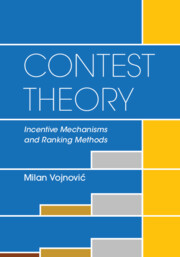Book contents
- Frontmatter
- Contents
- Preface
- 1 Introduction and Preview
- 2 Standard All-Pay Contest
- 3 Rank-Order Allocation of Prizes
- 4 Smooth Allocation of Prizes
- 5 Simultaneous Contests
- 6 Utility Sharing and Welfare
- 7 Sequential Contests
- 8 Tournaments
- 9 Rating Systems
- 10 Ranking Methods
- 11 Appendix
- References
- Index to Notations
- Index
1 - Introduction and Preview
Published online by Cambridge University Press: 05 January 2016
- Frontmatter
- Contents
- Preface
- 1 Introduction and Preview
- 2 Standard All-Pay Contest
- 3 Rank-Order Allocation of Prizes
- 4 Smooth Allocation of Prizes
- 5 Simultaneous Contests
- 6 Utility Sharing and Welfare
- 7 Sequential Contests
- 8 Tournaments
- 9 Rating Systems
- 10 Ranking Methods
- 11 Appendix
- References
- Index to Notations
- Index
Summary
This book synthesizes what one may refer to as contest theory, understood in a broad sense to encompass scientific methods and theories for the better understanding and informed design of contests. Its goal is to provide a contest designer with a set of theoretical results and methods that can be used for the design of contests. An ambitious aspiration is to provide a toolkit for a contest designer of a similar kind to what control theory offers to engineers for the design of control systems. This is, undoubtedly, a challenging task, primarily because of the complexity of user behavior and incentives that play a key role in most of the systems of concern. This book covers a wide range of models developed in different areas of science including computer science, economics, and statistics.
Generally speaking, we refer to contests as situations in which individuals invest efforts toward winning one or more prizes, those investments of efforts are costly and irreversible, and prizes are allocated based on the relative values of efforts. A prize is understood in a broad sense to refer to a notion of value that is general enough to include not only monetary prizes but also social reputation and gratitude. How to allocate a prize purse to competitors in a contest was studied as early as 1902 by Galton, who reasoned about the question, “what is the most suitable proportion between the values of first and second prizes?” assuming a statistical model according to which individual production outputs are independent and identically distributed random variables with a given distribution. An economist's approach is to assume that contestants are rational players who strategically invest efforts with a selfish goal of maximizing their individual payoffs, which combine in some way the value of winning a prize and the cost of production. The study of a contest as a game using the framework of game theory allows us to reason about properties that arise in a strategic equilibrium. The design of a contest needs to ensure that proper incentives are put in place to achieve a desired objective. Commonly studied objectives include the total effort invested by contestants, the maximum individual effort over all contestants, and the social welfare defined as the value of the prizes to those who win them.
- Type
- Chapter
- Information
- Contest TheoryIncentive Mechanisms and Ranking Methods, pp. 1 - 40Publisher: Cambridge University PressPrint publication year: 2016



